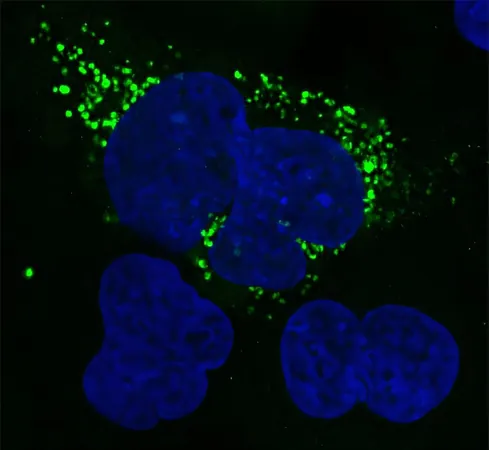
Unveiling the Hidden World of Microproteins: A Revolutionary AI Tool
2025-07-31
Author: Sarah
Unlocking the Secrets of the Human Genome
Proteins are the building blocks of life, performing crucial roles throughout our bodies. Yet, within the vast landscape of our genetic makeup lies a lesser-known subset known as microproteins, which have largely remained in the shadows, hidden within the 99% of DNA deemed as 'noncoding'.
Introducing ShortStop: The Game-Changer in Genetic Research
Enter ShortStop, a groundbreaking tool developed by scientists at the Salk Institute. This innovative AI technology is designed to illuminate the genome's murky corners, enabling researchers to uncover hidden microproteins with potentially significant biological relevance. By analyzing genetic databases, ShortStop identifies stretches of DNA that likely code for these elusive proteins, streamlining what has long been an arduous process.
From Shadows to Spotlight: The Impact of Microproteins
Despite their small size, microproteins are proving to be as impactful as their larger counterparts. The Salk team recently applied ShortStop to a lung cancer dataset, discovering a staggering 210 new microprotein candidates, including one particularly promising microprotein that could pave the way for cutting-edge therapies.
Why Microproteins Matter: The Paradigm Shift in Genetic Research
As senior author Alan Saghatelian puts it, "Despite knowing many proteins in our body, thousands of small proteins—microproteins—have been overlooked in what was once considered 'junk DNA.'" This revelation underscores a paradigm shift in genetic research, emphasizing the critical roles these microproteins may play in health and disease regulation.
The Challenge of Discovery: How ShortStop Overcomes Hurdles
Detecting microproteins is notoriously tricky due to their small size—often containing fewer than 150 amino acids—making traditional protein analysis methods ineffective. Instead of searching for the proteins directly, researchers leverage large datasets to find the DNA sequences that encode them. ShortStop revolutionizes this process by sorting potentially functional microproteins from nonfunctional ones, dramatically enhancing the speed and efficiency of discovery.
Machine Learning at its Best: The Power of ShortStop
ShortStop's machine learning capabilities allow it to assess whether a 'small open reading frame' (smORF) is likely to produce a functional microprotein. By comparing found smORFs against computer-generated decoys, ShortStop effectively narrows down experimental candidates, enabling researchers to focus efforts where they're most promising.
Accelerating Medical Discoveries: The Future of Health Research
With its ability to analyze common data types like RNA sequencing, ShortStop opens the door for extensive inquiries into both healthy and diseased tissues. This powerful tool not only identifies microproteins tied to conditions like cancer and Alzheimer's but also offers new paths for diagnosis and treatment.
A Promising Find: Microproteins in Lung Cancer
Already, the researchers have identified a microprotein linked to lung cancer that was more prevalent in tumor tissues than in normal tissues. This breakthrough illustrates ShortStop's potential in prioritizing candidates for further research and the development of therapies.
The Future Is Bright: Expanding Horizons in Genetic Research
With a treasure trove of existing genetic data at their fingertips, the Salk team is poised to unlock further mysteries. As Saghatelian notes, "We can now process data to unveil novel microproteins connected to various health issues, from Alzheimer's to obesity, transforming the landscape of genetic research and therapeutic interventions."

 Brasil (PT)
Brasil (PT)
 Canada (EN)
Canada (EN)
 Chile (ES)
Chile (ES)
 Česko (CS)
Česko (CS)
 대한민국 (KO)
대한민국 (KO)
 España (ES)
España (ES)
 France (FR)
France (FR)
 Hong Kong (EN)
Hong Kong (EN)
 Italia (IT)
Italia (IT)
 日本 (JA)
日本 (JA)
 Magyarország (HU)
Magyarország (HU)
 Norge (NO)
Norge (NO)
 Polska (PL)
Polska (PL)
 Schweiz (DE)
Schweiz (DE)
 Singapore (EN)
Singapore (EN)
 Sverige (SV)
Sverige (SV)
 Suomi (FI)
Suomi (FI)
 Türkiye (TR)
Türkiye (TR)
 الإمارات العربية المتحدة (AR)
الإمارات العربية المتحدة (AR)